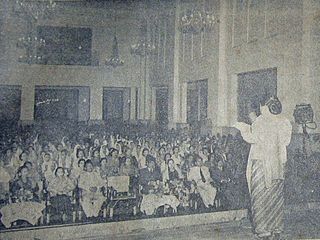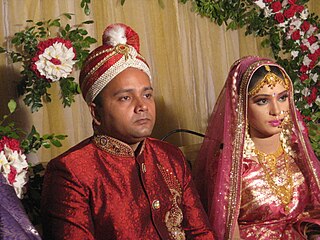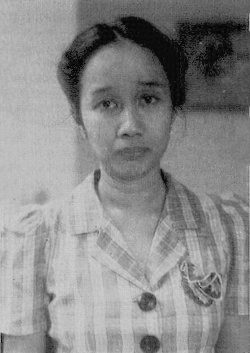Polygamy is the practice of marrying multiple spouses. When a man is married to more than one wife at the same time, sociologists call this polygyny. When a woman is married to more than one husband at a time, it is called polyandry. In sociobiology and zoology, researchers use polygamy in a broad sense to mean any form of multiple mating.

Hubertine Auclert was a leading French feminist and a campaigner for women's suffrage.
Nikah halala, also known as tahleel marriage, is a practice in which a woman, after being divorced by triple talaq, marries another man, consummates the marriage, and gets divorced again in order to be able to remarry her former husband. Nikah means marriage and halala means to make something halal, or permissible. This form of marriage is haram (forbidden) according to the hadith of Islamic prophet Muhammad. Nikah halala is practiced by a small minority of Muslims, mainly in countries that recognise the triple talaq.

Gerwani was a women's organization founded as Gerwis in Semarang, Central Java, on 4 June 1950.
Traditional Sunni and Shia Islamic marital jurisprudence allows Muslim men to be married to multiple women. Men can have up to four wives at a time according to the islamic jurisprudence.

Joseph Smith, the founder of the Latter Day Saint movement, privately taught and practiced polygamy. After Smith's death in 1844, the church he established splintered into several competing groups. Disagreement over Smith's doctrine of "plural marriage" has been among the primary reasons for multiple church schisms.

Women's suffrage in Utah was first granted in 1870, in the pre-federal period, decades before statehood. Among all U.S. states, only Wyoming granted suffrage to women earlier than Utah. Because Utah held two elections before Wyoming, Utah women were the first women to cast ballots in the United States after the start of the suffrage movement. However, in 1887 the Edmunds–Tucker Act was passed by Congress in an effort to curtail Mormon influence in the territorial government, disallowing the enfranchisement of the women residents within Utah Territory. Women regained the vote upon Utah statehood in 1896, when lawmakers included the right in the state constitution.
Polygamy is legal in Indonesia, the largest Muslim population in the world. Polygamy in Indonesia is not just practiced by Muslims, but also customarily done by non-Muslim minorities, such as the Balinese and the Papuans.
The legal status of polygamy varies widely around the world. Polygyny is legal in 58 out of nearly 200 sovereign states, the vast majority of them being Muslim-majority countries. Some countries that permit polygamy have restrictions, such as requiring the first wife to give her consent.
Isteri-Sedar was a women's organization established in Bandung, Indonesia in 1930 by Soewarni Pringgodigdo. It was a radical nationalist group founded on its anti-polygamy stance after the First Indonesian Women's Congress in 1928.

Muslim marriage and Islamic wedding customs are traditions and practices that relate to wedding ceremonies and marriage rituals prevailing within the Muslim world. Although Islamic marriage customs and relations vary depending on country of origin and government regulations, both Muslim men and women from around the world are guided by Islamic laws and practices specified in the Quran. Islamic marital jurisprudence allows Muslim men to be married to multiple women.

Maria Ulfah Soebadio Sastrosatomo, better known by her first married name Maria Ulfah Santoso, was an Indonesian politician and women's rights activist who served as Minister of Social Affairs under Prime Minister Sutan Sjahrir. She was the first Indonesian woman to receive a degree in law as well as the first female Indonesian cabinet member. Santoso, the daughter of a politician, became interested in women's rights after seeing numerous injustices in her youth. Despite pressure to become a doctor, she graduated with a degree in law from Leiden University in 1933; while in the Netherlands she also became involved in the Indonesian nationalist movement.

Siti Musdah Mulia is an Indonesian women's right activist and professor of religion. She was the first woman appointed as a research professor at the Indonesian Institute of Sciences, and is currently a lecturer of Islamic political thought at the School of Graduate Studies at Syarif Hidayatullah State Islamic University. Since 2007, Musdah has served as chairperson of the NGO Indonesian Conference on Religion and Peace, which aims to promote interfaith dialogue in Indonesia. She also served as director of the Megawati Institute, a think-tank established by former president Megawati Soekarnoputri.
Shirin Fozdar (1905–1992) was a women's rights activist. Born in India, she worked on women's rights and welfare issues in her native country in the 1930s and 1940s. In 1950 she and her husband moved to Singapore to help spread the Baháʼí Faith. In Singapore, she became a champion against marriage inequality and polygamy; she was instrumental in the founding of the Singapore Council of Women and of the nation's Syariah Court, and was a leader in the advocacy effort that saw the Women's Charter become law.

Feminism in Indonesia refers to the long history of discourse for gender equality to bring about positive social change in Indonesia. The issues women in Indonesia currently are facing include gender violence, underage marriages, and lack of representation in the political system. Feminism and the women's right movement began during colonial Indonesia under Dutch rule and were spearheaded by the national heroine Kartini, a Javanese noblewoman who advocated for the education of all women and girls regardless of social status. In the early 19th century, women's rights organizations and movements were allowed to developed under Budi Utomo, the first Indonesian Nationalist organization. Modern day Indonesian feminism include and are influenced by both fundamentalist and progressive Islamic women's organizations.

Rohana Muthalib was an Indonesian female beauty expert who served as the mayor of Pontianak from 1952 until 1956.

Siti Sukaptinah Sunaryo Mangunpuspito, also spelled Siti Soekaptinah Soenarjo Mangoenpoespito was an Indonesian women's rights activist and politician who was one of only two female members of the Investigating Committee for Preparatory Work for Independence and later became a member of the Indonesian parliament.

The Indonesian Women's Congress, often known by its Indonesian acronym Kowani, is a federation of Indonesian women's organizations which was founded in 1946. Its headquarters are located in Jakarta. The name also refers to national congresses which have taken place regularly since 1928. Since its founding the Congress has included women from various political and religious backgrounds; it has generally allowed independence and autonomy for its member organizations.
Joke Swiebel is a Dutch political scientist, and a former policy maker, politician and activist. Since the 1960s, she has been involved with the feminist and LGBT movements. She served as first chair of the Federation of Student Working Groups on Homosexuality and on the board of the COC Nederland while a student. In the former capacity, she was one of the organizers of the first LGB demonstration in the Netherlands — and probably all of Europe — which was held on January 21, 1969. It was a protest against a discriminatory provision in the Criminal Code, introduced in 1911, that set a significantly higher age of consent for homosexual than for heterosexual contact.After earning her master's degree in 1972 from the University of Amsterdam, she led the political science library at that institution until 1977. She was involved in the creation of the women's studies program at the university and worked to coordinate between activist groups to ensure that neither gender or sexual orientation were the basis for discriminatory policies.

Umi Sardjono was a prominent Indonesian activist who fought for the independence of the country and supported women's rights. She was involved in the anti-fascist and anti-war movements from the 1940s to the 1960s. As a resistance fighter during the Japanese occupation of the Dutch East Indies, she and her husband operated a food stall which served as a message center for the underground. Captured in 1944, the couple were imprisoned until the surrender of Japan. On gaining release, they worked in the independence movement hoping to free Indonesia from Dutch rule.












